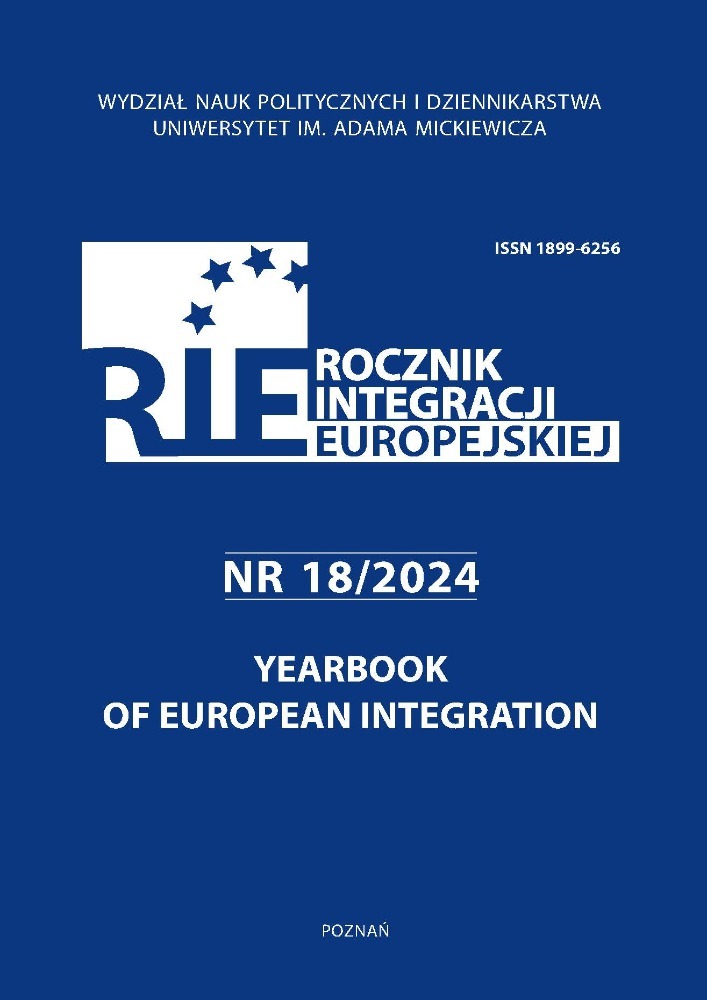Abstract
The political involvement of citizens is seen as an expression of their awareness of their rights, their ability to use democratic mechanisms, their respect for the rules, their ability to influence the socio-political reality. An interesting case study is Albania, a state for years characterised by a non-democratic political system, economically weak, repressive, but which has been implementing democratic governance mechanisms for years. The process of political transformation initiated at the beginning of the 1990s was followed by far-reaching changes that also included the empowerment of society and its political activism. The aim of the article is to identify the factors currently determining the level and nature of women’s political involvement, to analyse the impact of electoral quotas on women’s political participation and to diagnose the challenges and barriers related to women’s political participation. The article focuses on identifying both formal and informal barriers that inhibit women’s full participation in politics, despite the existence of legal frameworks designed to promote gender equality. The key research question is: what are the main barriers and constraints to women’s political participation in Albania and how do they affect the effectiveness of the gender equality mechanisms put in place? Based on an analysis of existing research and literature on the political situation of women in Albania, the article assumes that the quota system in Albania is effective in increasing women’s numerical representation, but that it does not eliminate the structural and cultural constraints that inhibit their real influence in politics. Furthermore, it was assumed that despite formal commitments to gender equality, patriarchal social norms continue to limit women’s political aspirations, leading to their marginalisation in decision-making processes, and that the lack of adequate economic and institutional resources is one of the main factors limiting women’s full participation in Albanian politics.
References
Albania Progress Report (2014), https://neighbourhood-enlargement.ec.europa.eu/document/download/68b4a3e7-d9c6-4edb-9cba-47a826a54b95_en?filename=20141008-albania-progress-report_en.pdf, 18.10.2024.
Burra dhe gra 2023 men and women, https://www.instat.gov.al/media/12598/burra-dhe-gra-2023.pdf, 18.10.2024.
Commission Staff Working Document Albania 2019 Report Accompanying the document Communication from the Commission to the European Parliament, the Council, the European Economic and Social Committee and the Committee of the Regions 2019 Communication on EU Enlargement Policy, https://neighbourhood-enlargement.ec.europa.eu/document/download/d14ab736-12ef-4892-bf95-51d7de7a2840_en?filename=20190529-albania-report.pdf, 18.10.2024.
Commission Staff Working Document Albania 2021 Report Accompanying the document Communication from the Commission to the European Parliament, the Council, the European Economic and Social Committee and the Committee of the Regions 2021 Communication on EU Enlargement Policy, https://neighbourhood-enlargement.ec.europa.eu/document/download/7532fb68-5bd9-4620-ae9c-1df47d34b919_en?filename=Albania-Report-2021.pdf&prefLang=pl, 18.10.2024.
Dani D. (2024), The Condition of Albanian Women: Political Propaganda and Social Change, https://politicsrights.com/albanian-women-communism-illusion-liberation/, 18.10.2024.
Domagała K., Żukiewicz P. (2018), Ewolucja prawa wyborczego do parlamentu Republiki Albanii po 1990 roku, „Przegląd Prawa Konstytucyjnego”, nr 5.
Gender Equality Index 2023, https://eige.europa.eu/gender-equality-index/2023, 18.10.2024.
Gender Equality Index for the Republic of Albania 2020, https://eige.europa.eu/sites/default/files/gender_equality_index_albania.pdf, 18.10.2024.
Gender Quotas and Women’s Substantive Representation in the Local Councils of Albania, https://www.undp.org/sites/g/files/zskgke326/files/migration/al/ENGLISH.pdf, 18.10.2024.
Gender Quotas and Women’s Substantive Representation in the Local Councils of Albania, https://www.undp.org/sites/g/files/zskgke326/files/migration/al/ENGLISH.pdf, 18.10.2024.
Gratë që kanë drejtuar partitë politike nga 1944 e deri më sot, https://kohajone.com/politike/grate-qe-kane-drejtuar-partite-politike-nga-1944-e-deri-me-sot/, 18.10.2024.
Grupi parlamentar „Demokraci dhe Integrim”, https://www.parlament.al/struktura/725732ce-d21b-46c4-bc18-7b573a3341d4, 18.10.2024.
LIGJ Nr. 10 019, datë 29.12.2008, Kodi Zgjedhor I Republikës së Shqipërisë, https://kqz.gov.al/wp-content/uploads/2024/09/Kodi-Zgjedhor-2020_perditesuar1-2.pdf, 18.10.2024.
LIGJ Nr. 10 019, datë 29.12.2008, Kodi Zgjedhor I Republikës së Shqipërisë, https://kqz.gov.al/wp-content/uploads/2024/09/Kodi-Zgjedhor-2020_perditesuar1-2.pdf, 18.10.2024.
LIGJ NR. 8417, DATË 21.10.1998, (Amenduar me ligjin nr. 9675, datë 13.1.2007, me ligjin nr. 9904, date 21.4.2008, me ligjin nr.88/2012, me ligjin nr.137/2015 dhe me ligjin nr.76/2016), https://www.gjk.gov.al/web/kushtetuta_e_integruar_me_ndryshimet_e_2016_1648.pdf, 18.10.2024.
Men and Women in Albania (2022), https://www.instat.gov.al/en/themes/demography-and-social-indicators/gender-equality/publication/2023/men-and-women-in-albania-2022/, 18.10.2024.
Monthly ranking of women in national parliaments, https://data.ipu.org/women-ranking/?date_month=6&date_year=2024, 18.10.2024.
Për barazinë gjinore në shoqëri, https://qbz.gov.al/eli/ligj/2008/07/24/9970, 18.10.2024.
Podgórzańska R. (2020), Polska wobec europejskich aspiracji Albanii, w: Gospodarka i polityka w czasach przemian, pod red. M. Kamoli-Cieślik, Ł. Tomczaka, Szczecin.
Podgórzańska R. (2018), Albania w procesie integracji z UE – stan i perspektywy akcesji, „Rocznik Integracji Europejskiej”, nr 12. DOI: https://doi.org/10.14746/rie.2018.12.14
Qeveria, https://www.kryeministria.al/en/menu-qeveria/, 18.10.2024.
Strategjia kombëtare për barazinë gjinore 2021–2030, https://awenetwork.org/media/646208786d90c.pdf, 18.10.2024.
Strukturat, https://www.parlament.al/deputet/afb72233-f771-4b06-a51a-a42eaef51077, 18.10.2024.
UN in Albania advocates for review of the Gender Equality Law. Interview with Michele Ribotta, Head of the UN Gender Group and UN Women Representative in Albania, https://albania.unwomen.org/en/stories/interview/2023/03/un-in-albania-advocates-for-review-of-the-gender-equality-law, 18.10.2024.
Zgjedhjet për Kuvend 25 prill 2021, https://kqz.gov.al/results/results2021/results2021.htm, 18.10.2024.
Zgjedhjet Vendore, 14 Maj 2023, https://iemis.kqz.gov.al/results2023/results2023.htm?lang=AL, 18.10.2024.
License
Copyright (c) 2024 Renata Podgórzańska

This work is licensed under a Creative Commons Attribution-ShareAlike 4.0 International License.

